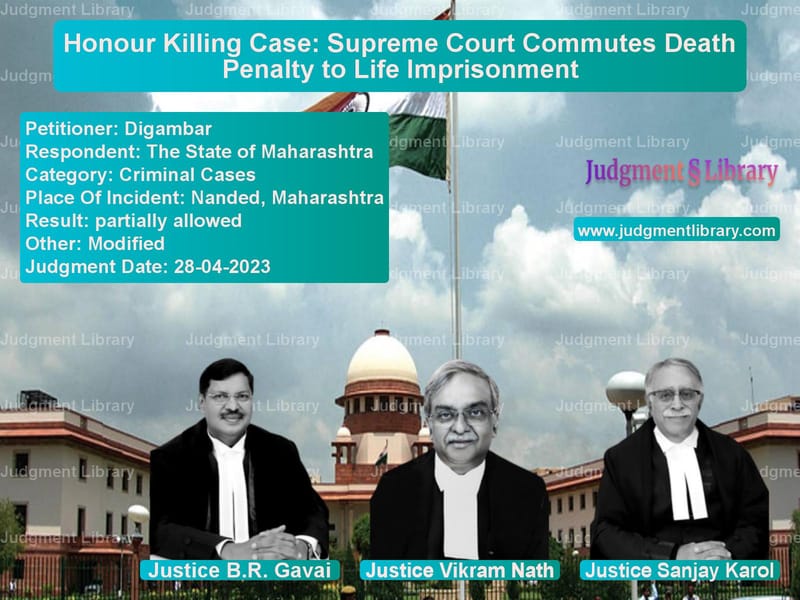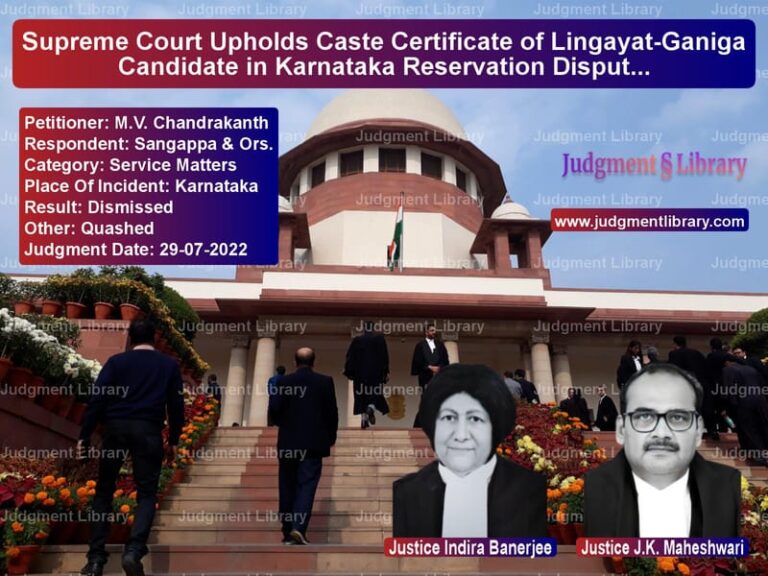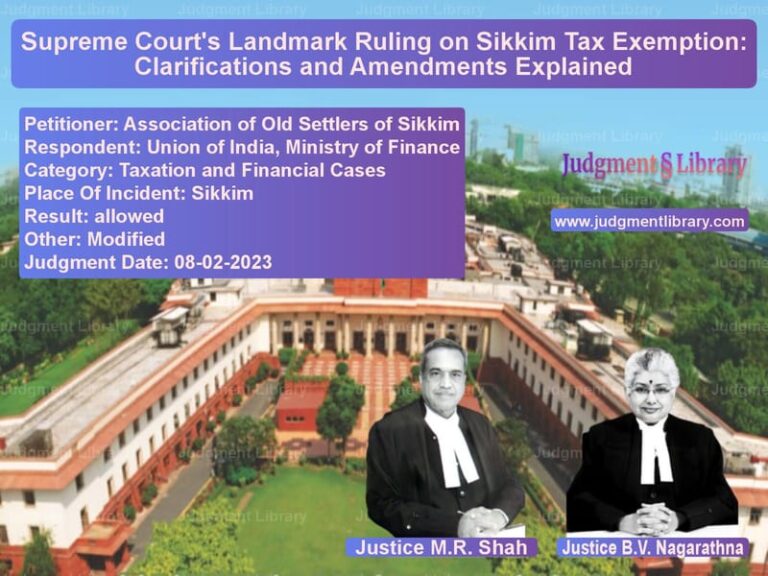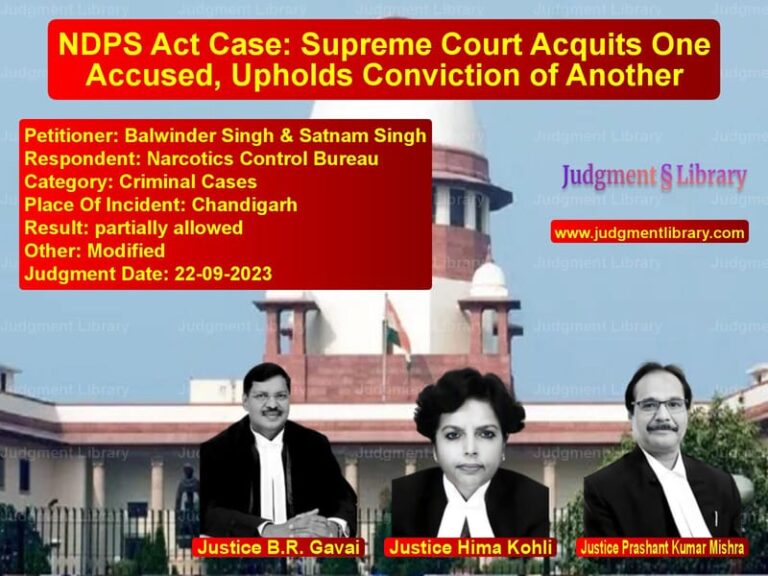Honour Killing Case: Supreme Court Commutes Death Penalty to Life Imprisonment
The Supreme Court of India in the case of Digambar vs. The State of Maharashtra addressed a brutal case of honour killing where the appellant was accused of murdering his sister and her partner. The Court reviewed whether the case fell within the ‘rarest of rare’ category deserving of the death penalty. Ultimately, the Court commuted the appellant’s sentence from death to life imprisonment, considering various mitigating factors.
The case revolves around the killing of Pooja and Govind by Pooja’s brother, Digambar, who was enraged by their love affair. The Supreme Court examined the legal principles governing capital punishment and the circumstances leading to the crime, ultimately concluding that it was not a ‘rarest of rare’ case warranting the death penalty.
Background of the Case
Pooja, the deceased, was married to Jethiba Hashanna Varshewar but was in a relationship with Govind for five years. On July 22, 2017, Pooja left her matrimonial home without informing anyone, prompting her husband to file a missing person’s report.
Digambar, her brother, suspected that Pooja had eloped with Govind. He repeatedly called Govind, but the latter denied being with Pooja. The next day, July 23, 2017, Digambar, along with his accomplice Mohan, found Pooja and Govind at the house of Govind’s sister. Assuring Pooja that he would arrange her marriage with Govind, Digambar took them along on a motorcycle ride. However, en route, near a canal, he attacked Govind with a sickle and later assaulted Pooja, killing both on the spot.
After committing the crime, Digambar himself approached the police and confessed to the killings. The case proceeded to trial, where the lower courts imposed the death penalty, later challenged before the Supreme Court.
Legal Proceedings
Trial Court Decision
- The Trial Court found Digambar guilty under Sections 302, 201, and 120-B of the IPC.
- He was sentenced to death, while Mohan was sentenced to life imprisonment.
- The case was referred to the High Court for confirmation of the death penalty.
High Court Decision
- The Bombay High Court upheld the death penalty for Digambar, affirming the Trial Court’s verdict.
- Mohan’s life sentence was also upheld.
- The High Court classified the case as a ‘rarest of rare’ case justifying capital punishment.
Supreme Court Review
The case was then brought before the Supreme Court through appeals challenging the capital sentence.
Arguments Presented
Appellants (Defense) Arguments
- The conviction was primarily based on extra-judicial confession, which is inadmissible.
- There was no direct evidence apart from the ‘last seen’ theory.
- The prosecution’s reliance on circumstantial evidence was insufficient to warrant the death penalty.
- The time gap between when the accused was last seen with the victims and their deaths was long enough to create doubt.
- Even if guilty, the case did not meet the criteria for the ‘rarest of rare’ doctrine.
Respondent (Prosecution) Arguments
- The murder was a case of honour killing, motivated by opposition to the inter-caste relationship.
- The manner of the killing was brutal, and the accused showed no remorse.
- The accused had deliberately planned the murders and used a sickle to execute them.
- Given the social impact of the crime, capital punishment was the only suitable deterrent.
Supreme Court’s Observations
The Supreme Court, led by Justices B.R. Gavai, Vikram Nath, and Sanjay Karol, made the following key observations:
- Conviction Justified: The Court upheld the conviction of both Digambar and Mohan.
- Death Penalty Not Warranted: The case did not fall under the ‘rarest of rare’ category.
- Reformation Possible: The accused had no prior criminal record and had shown good behavior in prison.
- Sentencing Precedents: The Court cited previous judgments where death penalties were commuted in similar cases.
The Court noted:
“The accused does not have any criminal antecedents. He was a young boy of about 25 years at the time of the incident. The medical evidence further reveals that the accused has not acted in a brutal manner, as there was only a single injury inflicted on both the deceased.”
Final Judgment
The Supreme Court issued the following rulings:
- Digambar’s death sentence was commuted to life imprisonment.
- Mohan’s life sentence was upheld.
- The Court observed that the appellant could be rehabilitated and was not beyond reform.
Implications of the Judgment
The ruling has significant implications for future cases involving honour killings and the application of the death penalty.
- Strict Guidelines for Capital Punishment: The judgment reinforces that death sentences should only be imposed in the ‘rarest of rare’ cases.
- Reformation as a Consideration: The Court highlighted that reformation and rehabilitation should be considered while awarding sentences.
- Honour Killings and Legal Recourse: The judgment clarifies that while honour killings are heinous crimes, the punishment must be proportional.
Conclusion
The Supreme Court’s decision in Digambar vs. The State of Maharashtra reaffirms the principles guiding capital punishment in India. By commuting the death sentence to life imprisonment, the Court has emphasized the need for a balanced approach to justice, ensuring that penalties are proportionate to the crime committed. This ruling serves as a crucial precedent in cases involving honour killings and the sentencing standards applied to such cases.
Petitioner Name: Digambar.Respondent Name: The State of Maharashtra.Judgment By: Justice B.R. Gavai, Justice Vikram Nath, Justice Sanjay Karol.Place Of Incident: Nanded, Maharashtra.Judgment Date: 28-04-2023.
Don’t miss out on the full details! Download the complete judgment in PDF format below and gain valuable insights instantly!
Download Judgment: digambar-vs-the-state-of-maharas-supreme-court-of-india-judgment-dated-28-04-2023.pdf
Directly Download Judgment: Directly download this Judgment
See all petitions in Murder Cases
See all petitions in Bail and Anticipatory Bail
See all petitions in Judgment by B R Gavai
See all petitions in Judgment by Vikram Nath
See all petitions in Judgment by Sanjay Karol
See all petitions in partially allowed
See all petitions in Modified
See all petitions in supreme court of India judgments April 2023
See all petitions in 2023 judgments
See all posts in Criminal Cases Category
See all allowed petitions in Criminal Cases Category
See all Dismissed petitions in Criminal Cases Category
See all partially allowed petitions in Criminal Cases Category







